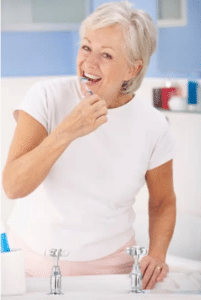Dental Care for Seniors: Special Considerations and Oral Health Tips
Introduction
 As we age, taking care of our overall health becomes increasingly important, and oral health is no exception. Maintaining good dental care is crucial for seniors to prevent oral health issues and ensure a comfortable and healthy life. However, dental care for seniors often requires special considerations due to age-related factors. In this blog post, we will explore some essential tips and guidelines for senior dental care, addressing the unique challenges that seniors may face.
As we age, taking care of our overall health becomes increasingly important, and oral health is no exception. Maintaining good dental care is crucial for seniors to prevent oral health issues and ensure a comfortable and healthy life. However, dental care for seniors often requires special considerations due to age-related factors. In this blog post, we will explore some essential tips and guidelines for senior dental care, addressing the unique challenges that seniors may face.
Special Considerations for Senior Dental Care
- Dry Mouth: Many seniors experience dry mouth, also known as xerostomia, which can lead to tooth decay, gum disease, and difficulty chewing and swallowing. Seniors should drink plenty of water, use saliva substitutes, and avoid caffeine and alcohol, which can worsen dry mouth symptoms. Chewing sugar-free gum or sucking on sugar-free candies can help stimulate saliva flow.
- Medications: Seniors often take multiple medications, some of which can have oral health side effects. Certain medications may cause dry mouth, gum problems, or increased risk of bleeding. It's crucial for seniors to inform their dentist about all the medications they are taking to determine any necessary preventive measures. The dentist may recommend adjustments in medication dosage or provide additional oral care recommendations.
- Gum Disease: Older adults are more susceptible to gum disease due to factors such as decreased immune function and the presence of chronic diseases. Seniors should maintain proper oral
 hygiene by brushing twice a day, flossing daily, and scheduling regular dental check-ups to detect and address gum disease early. Sometimes, the dentist may recommend more frequent cleanings to manage gum health effectively.
hygiene by brushing twice a day, flossing daily, and scheduling regular dental check-ups to detect and address gum disease early. Sometimes, the dentist may recommend more frequent cleanings to manage gum health effectively. - Tooth Sensitivity: Aging can lead to receding gums and exposed tooth roots, resulting in increased tooth sensitivity. Seniors should use toothpaste specifically designed for sensitive teeth and avoid acidic and cold foods that can aggravate sensitivity. Using a soft-bristled toothbrush and practicing gentle brushing techniques can also help minimize discomfort.
- Oral Cancer: The risk of oral cancer increases with age. Seniors should be vigilant about any changes or abnormalities in their mouth, including persistent sores, lumps, or white or red patches. Regular dental check-ups should include an oral cancer screening, where the dentist examines the mouth, tongue, and throat for any signs of cancerous or precancerous lesions.
Oral Health Tips for Seniors
- Regular Dental Check-ups: Seniors should visit their dentist at least twice a year for comprehensive oral examinations and professional cleanings. Regular check-ups can help identify and treat dental issues early, preventing complications down the line. These visits also allow the dentist to monitor the overall oral health and provide personalized recommendations.
- Proper Denture Care: If seniors wear dentures, they should clean them daily with denture cleaners or mild soap and water. Dentures should be removed at night to allow the gums to rest and be stored in a clean container with water. Regular dental check-ups for denture wearers are
 essential to ensure a proper fit and to address any irritation or sore spots that may arise.
essential to ensure a proper fit and to address any irritation or sore spots that may arise. - Good Oral Hygiene: Seniors should continue to practice good oral hygiene by brushing their teeth twice a day using a soft-bristle toothbrush and fluoride toothpaste. They should also clean between their teeth daily using floss or interdental brushes to remove plaque and food particles. If manual dexterity becomes challenging, using an electric toothbrush or adaptive oral hygiene aids can be beneficial.
- Healthy Diet: A balanced diet plays a vital role in maintaining oral health. Seniors should consume a variety of fruits, vegetables, whole grains, and lean proteins. Adequate calcium and vitamin D intake is essential for strong teeth and bones. Limiting sugary snacks and beverages can help prevent tooth decay. Consulting with a nutritionist or dietitian can provide seniors with personalized dietary recommendations.
- Avoid Tobacco and Limit Alcohol: Smoking or using tobacco products can significantly impact oral health, increasing the risk of gum disease, oral cancer, and tooth loss. Seniors should seek support and resources to quit smoking if they are tobacco users. Additionally, seniors should moderate their alcohol consumption as excessive alcohol can contribute to dry mouth and other oral health problems.
Conclusion
Caring for oral health is crucial for seniors to maintain overall well-being and quality of life. By understanding the special considerations for senior dental care and following the provided tips, seniors can take proactive steps to prevent oral health issues and enjoy a healthy smile for years to come. Remember, regular dental check-ups and a consistent oral hygiene routine are key to optimal oral health at any age. With proper care and attention, seniors can maintain their oral health and continue to smile confidently in their golden years.
Ready to find out more?
Contact us for more information!
